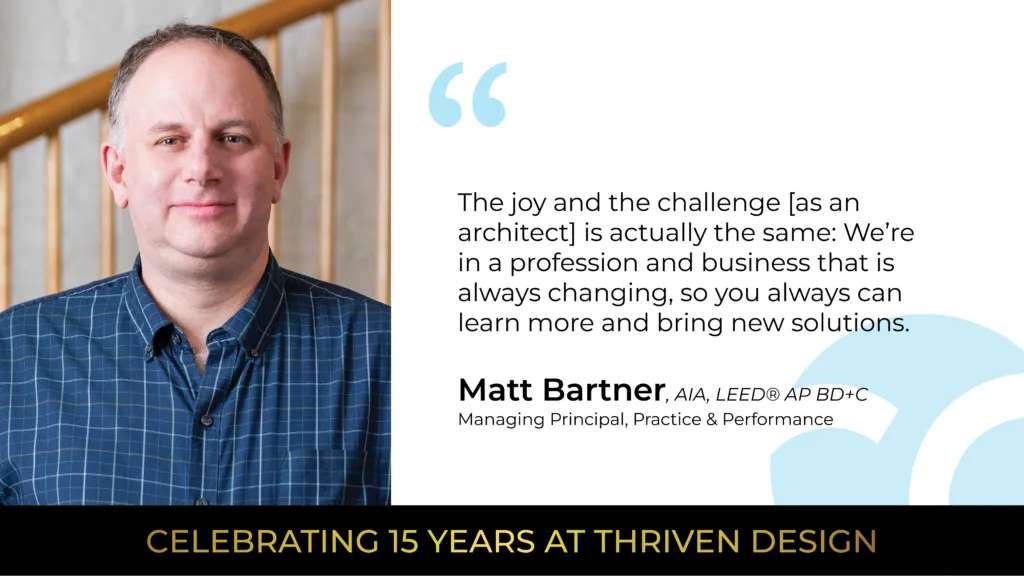A 15th Anniversary Interview with Managing Principal of Practice & Performance, Matt Bartner

Thriven Design is happy to congratulate Managing Principal Matthew Bartner, AIA, LEED AP BD+C, on his 15th anniversary with the firm. Since joining Thriven Design in April 2009, Matt’s architectural expertise, command of Business Operations, and leadership as Managing Principal have strengthened Thriven Design and advanced the firm’s position in core multifamily and student housing markets. Matt’s skill as a project manager has assisted countless developers, nonprofits, and community project partners in achieving their vision for their built environments, enabling them to serve others and create places where people thrive.
Matt recently provided some insight into his career journey, as well as advice for young architects. We share his comments below in a special 15th anniversary interview:
What led you to architecture as a career? Did anything, or anyone, in particular inspire you?
For me, architecture was about finding a career that gave me the opportunity to create and problem-solve, and I liked that it was a career that had a variety of possible paths to success. When I was younger, I didn’t necessarily know I was looking for all of that, but as I continued to work in the profession and learn, it eventually became clear.
I’ve always found the work of Norman Foster and Santiago Calatrava to be truly inspiring, because they each create structures that are both highly technical and cutting-edge, but also beautiful. BIG is another firm that really shows us how the work we do as design professionals can address multiple challenges in creative and inspiring ways.
What is the biggest difference in your day-to-day when comparing your role now to your first year at Thriven Design?
I came to Thriven from a background of working with educational institutions, so multifamily housing was mostly new to me. I was fortunate to have a lot of kind folks in the office who helped me learn the many, many things I didn’t know, and I was able to really focus on absorbing as much technical knowledge as quickly as I could. This was also the same time period in which our Engineering group ramped-up with the firm, so I was also able to learn a lot about MEP systems – and frankly more in just a few years than I had learned in the decade before that point.
Over time, I started to focus on parts of our work beyond the technical – first focusing on project management and how we could improve what we do in that part of the business, and from there growing into more of a business operations role that encompassed both professional practice as well as the support efforts that allow our teams to do great work. Today, I get to enjoy leading some of our student housing and affordable housing work as well as continuing to focus on the overall practice and improving what we do each and every day.
Over time, I started to focus on parts of our work beyond the technical – first focusing on project management and how we could improve what we do in that part of the business, and from there growing into more of a business operations role that encompassed both professional practice as well as the support efforts that allow our teams to do great work.
Matt Bartner, AIA, LEED AP BD+C
As an architect and leader of the firm, what are the most common challenges you face and what brings you the most joy?
I think the joy and the challenge is actually the same: We’re in a profession and business that is always changing, so you always can learn more and bring new solutions. That also means that you can’t always rely on doing things this year the same way that you did them last year, so being an expert in what we do means there is always more growth available to each of us.
What advice would you give to aspiring architects just beginning their careers?
It sounds trite, but the one thing that has helped me throughout my career is absorbing every little detail that you can from the work that you do and the people that you work with, especially clients and other partners. Over time, I have learned a million little things about the world and other businesses, and often times those little details come back and prove useful when you least expect it!
